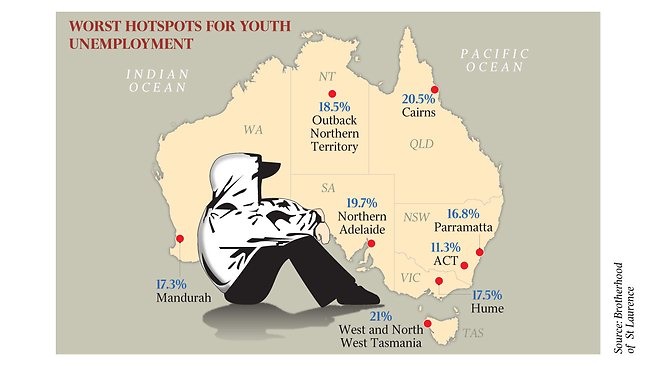Generation stalled: young, underemployed and living in poverty in Australia, Melbourne, 2017
In total [says the report] more than 650,000 young people were unemployed or underemployed – defined as having some work but wanting more hours – in February 2017. Precarious employment is hindering the capacity of many young people, especially those without qualifications and skills, to build satisfying and productive adult lives, as the pathways that were open to their parents appear to have stalled. Our analysis, drawing on data from the Australian Bureau of Statistics (ABS) and the Household, Income and Labour Dynamics in Australia (HILDA) Survey, confirms disturbing trends:
-
Underemployment, at 18 per cent of the youth labour force (February 2017), is the highest in the 40 years since the count officially began. The challenge now affects even more young people than unemployment, currently at 13.5 per cent.
-
Young people are far more likely to be in casual and part-time jobs than at the beginning of this millennium.
-
In the past 15 years the average gap has widened between the actual working hours of young underemployed people and the hours they would like to work.
-
The growing number of young people combining study with work does not explain the rise in underemployment, as the rise in the percentage of casual and part-time jobs has mostly been among young workers who are not studying.
Coverage in The Conversation (Michelle Grattan) and Guardian Australia (Helen Davidson). For more than two years, Honest History has been collecting material on inequality. We have been struck by how many reports there have been on the many contributors to inequality, one of which is youth underemployment and unemployment. Many of these reports use the same or very similar data, but they have been met with very little imagination on the government policy side. One of the most arresting pieces of data was a chart from 2014, again sourced from the Brotherhood of St Laurence:
 Youth unemployment, 2014 (The Australian/Brotherhood of St Laurence)
Youth unemployment, 2014 (The Australian/Brotherhood of St Laurence)
The Honest History Book, now available in bookstores or for order online, includes a chapter by Carmen Lawrence, former federal minister and premier of Western Australia. The chapter is called ‘”Fair go” nation? Egalitarian myth and reality in Australia’ and it includes these words:
Until recently, … awareness of the need to reduce economic inequality had largely disappeared from the policy agenda in Australia and many other countries. Inequality was routinely overlooked in public discussions about solving our social problems. Indeed, some people clearly regard inequality as an inevitable consequence of the operation of free markets – in the words of economist James Galbraith, a kind of “black rain, a curse of obscure origin with no known remedy, a matter of mystery covered by words like downsizing, deregulation or globalization”..